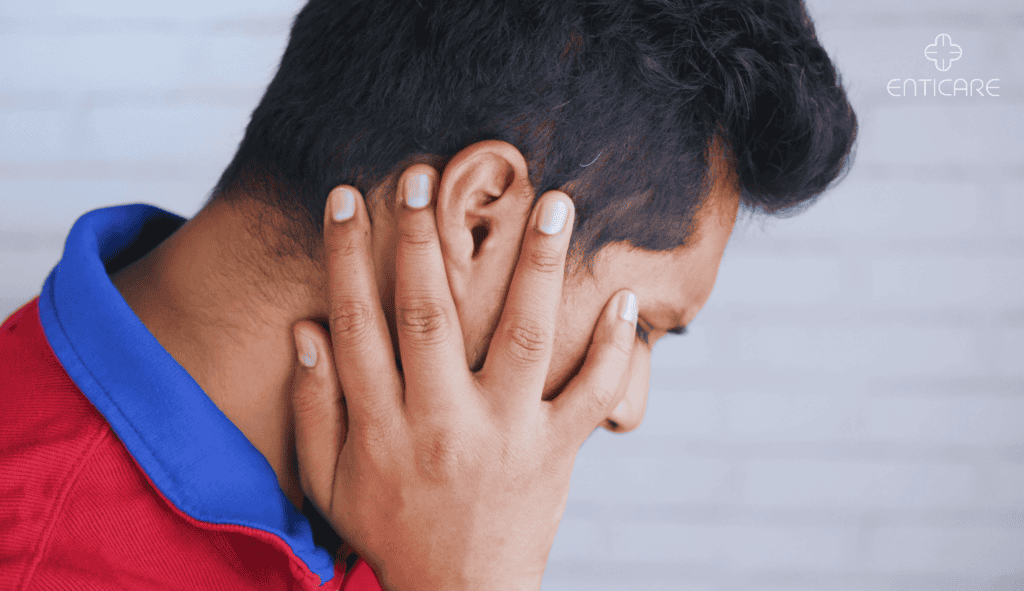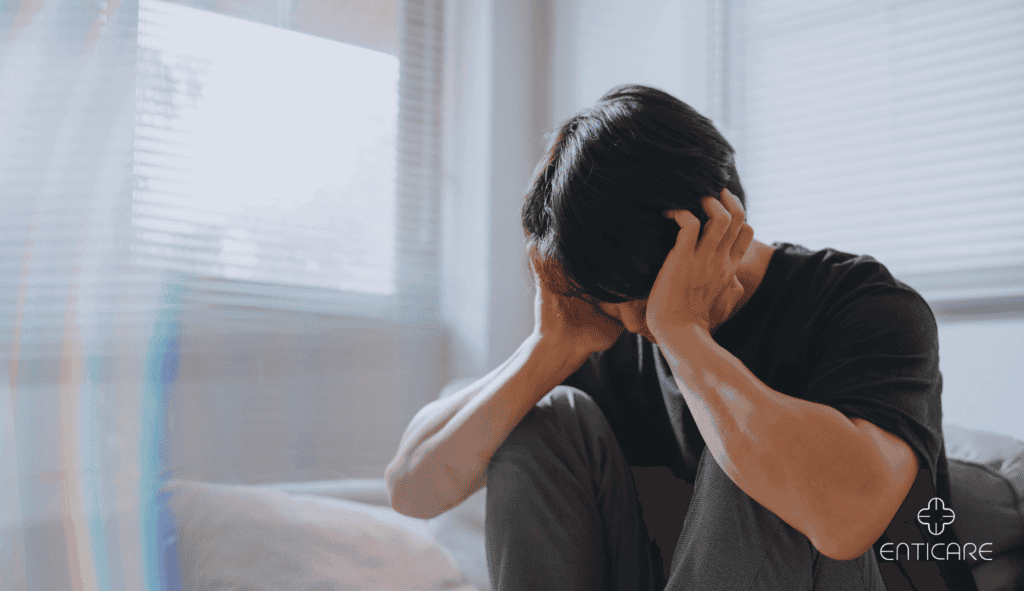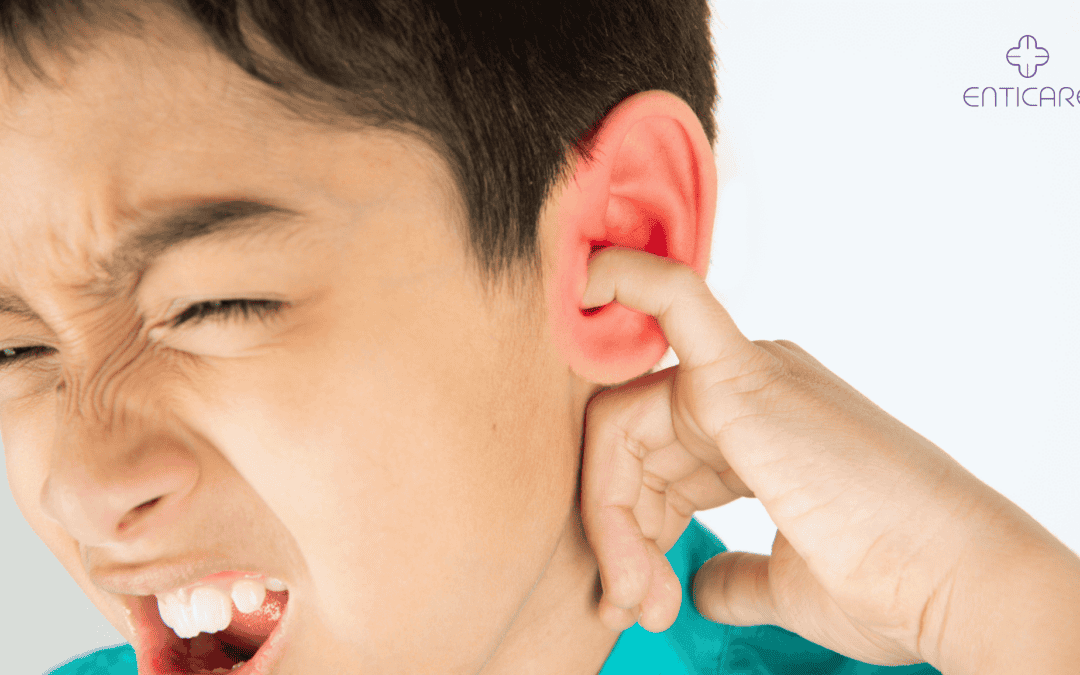Anxiety impacts various aspects of our physical health, often in surprising ways. One such connection is the link between anxiety and ear pressure. Anxiety affects the ears by causing symptoms such as ear popping and pressure changes, which can result from heightened stress and the body’s stress response, leading to increased discomfort during anxious moments. Understanding this relationship can help you take better control of both your mental and physical health.
In this blog, we will explore how anxiety and ear pressure are connected, what symptoms to watch for, and how you can manage these issues effectively.

What Is Ear Pressure, and Why Does It Happen?
Ear Pressure Explained
Ear pressure, also known as a sensation of fullness in the ears, occurs when the pressure in the middle ear does not equalize properly with the external environment. This often feels like having a clogged ear or being underwater.
- Middle Ear Pressure: The middle ear contains the Eustachian tube, which helps regulate pressure. When it becomes blocked or experiences Eustachian tube dysfunction, ear pressure builds up.
- Barometric Changes: Ear pressure can change when traveling in planes or ascending mountains, due to rapid shifts in air pressure.
- Fluid Buildup: In some cases, fluid may accumulate behind the eardrum, causing additional pressure.
Stress hormones can disrupt ear fluid homeostasis, leading to pressure buildup and various inner ear dysfunctions.
Symptoms to Watch For
If anxiety contributes to your ear pressure, you may experience additional symptoms, such as:
- Ringing in the ears (tinnitus)
- Sensitivity to sound (hyperacusis)
- Difficulty hearing or muffled sounds
- Auditory processing issues, such as difficulty distinguishing between different sounds
Ear pressure symptoms can be exacerbated by anxiety and stress, and managing anxiety can help alleviate these symptoms.

How Does Anxiety Cause Ear Pressure?
Stress and Muscle Tension
When anxiety strikes, the body reacts in a variety of ways, one of which is increased muscle tension. This tension can impact the muscles surrounding the ears, leading to pressure.
- Tight Jaw Muscles: Anxiety can cause people to clench their jaw or grind their teeth, known as jaw clenching, which puts pressure on the muscles around the ear and can affect hearing.
- Neck Strain: The tension from stress often builds up in the neck, which can impact the ears, adding to the sensation of fullness.
Hyperventilation and Ears
Anxiety often leads to hyperventilation or rapid breathing, which can change the balance of oxygen and carbon dioxide levels in the blood. These fluctuations can cause dizziness and affect the pressure within the inner ear.
- Inner Ear Imbalance: Hyperventilation can upset the fluid balance in the inner ear, leading to pressure, dizziness, or vertigo. This disruption in inner ear fluid homeostasis can exacerbate symptoms such as tinnitus and vertigo.
- Ear-Popping Sensation: When hyperventilating, the pressure in the middle ear may not adjust as it should, leading to feelings of fullness or ear-popping.
Fight-or-Flight Response
When we experience anxiety, our body’s stress response is triggered, releasing stress hormones like cortisol and adrenaline into the bloodstream. This fight-or-flight response affects the entire body, including the ear canal.
- Circulation Changes: The rush of blood to your extremities during a stress response may cause temporary pressure changes in the ears.
- Auditory Sensitivity: When anxious, people may also become more sensitive to auditory stimuli, which can exaggerate the sensation of pressure or discomfort in the ears.
- The release of stress hormones during the fight-or-flight response can lead to conditions like tinnitus and vertigo.
The Impact of Chronic Stress
Chronic stress can have a significant impact on both mental and physical health. Prolonged stress can lead to:
- Anxiety Disorders: Chronic stress can contribute to the development of anxiety disorders, including generalized anxiety disorder and panic disorder.
- Ear Problems: Chronic stress can contribute to ear problems, including ear pressure and tinnitus.
- Mental Health Issues: Chronic stress can contribute to mental health issues, including depression and anxiety.
- Physical Health Issues: Chronic stress can contribute to physical health issues, including hypertension and cardiovascular disease.

Anxiety-Related Ear Pressure vs. Medical Conditions
How to Differentiate Between Anxiety and Ear Conditions
It is important to distinguish between anxiety-related ear pressure and other ear issues caused by medical conditions, such as infections or earwax buildup.
- Duration: Anxiety-related ear pressure may come and go depending on stress levels, while ear infections tend to persist and worsen without treatment.
- Pain: Anxiety-related ear pressure typically causes discomfort but not sharp pain. In contrast, an ear infection may involve acute pain, fever, or discharge.
- Accompanying Symptoms: If you experience fever, hearing loss, or severe pain, medical conditions like infections may be more likely than anxiety.
When to Seek Medical Attention
If you’re uncertain whether your ear pressure is related to anxiety or another health problem, consult with a healthcare professional.
- Persistent Symptoms: If ear pressure continues or worsens, even during calm periods, you should see a specialist.
- Other Symptoms: Hearing loss, dizziness, or ringing in the ears may indicate other underlying issues, such as Meniere’s disease or an ear infection.
ENT Evaluation
An ENT (ear, nose, and throat) specialist can determine whether your ear symptoms are anxiety-related or if you need treatment for a medical condition.
When to Seek Professional Help
Working with an ENT Specialist
While anxiety may be the source of your ear pressure, it’s important to rule out any underlying ear conditions. A comprehensive evaluation by an ENT specialist can help.
- Comprehensive Ear Exam: An ENT doctor can examine your ears for signs of infection, wax buildup, or other issues that might be causing pressure.
- Hearing Test: If you experience hearing loss alongside ear pressure, an audiologist can assess your hearing.
The Importance of Mental Health Support
Addressing the mental health aspect of your symptoms is essential for long-term relief. Consulting a therapist or counselor who specializes in anxiety disorders can provide coping strategies.
- Cognitive Behavioral Therapy (CBT): This therapy can help individuals understand and manage their anxiety-related ear symptoms.
- Mind-Body Approaches: Yoga, acupuncture, and relaxation therapies may also help reduce anxiety and its physical effects on the ears.
Holistic Approach to Treatment
Managing anxiety-related ear pressure often requires a combination of physical and mental health treatments. By working with both an ENT specialist and a mental health provider, you can create a comprehensive care plan.
Take Control of Your Ear Health
Anxiety and ear pressure often go hand-in-hand, but you don’t have to suffer in silence. If you’re experiencing persistent ear pressure or discomfort, it’s important to seek professional help to rule out any underlying medical conditions and to find effective ways to manage your anxiety.
Ready to find relief? Schedule an appointment with ENTicare today to address your ear pressure and any related issues. Our specialists are here to help you achieve better health and peace of mind.

